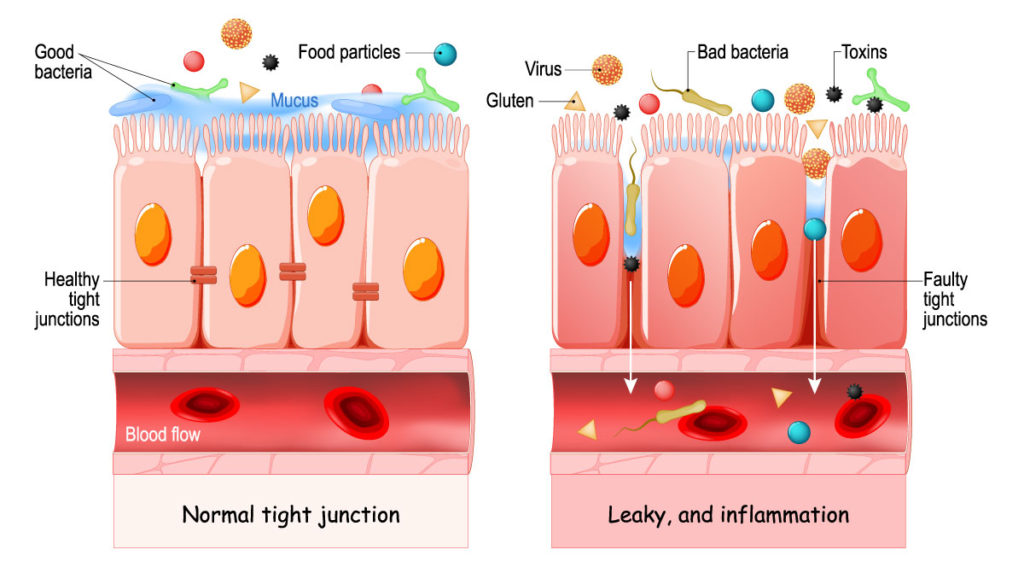
The intricate workings of our gut are fascinating, and dysbiosis and leaky gut are buzzwords that often emerge in discussions about gut health. While they may seem interchangeable, it is crucial to understand their differences to address gastrointestinal concerns effectively.
Defining Dysbiosis
Dysbiosis refers to an imbalance in the gut microbiota, the diverse community of microorganisms residing in our gastrointestinal tract. Our gut is home to trillions of bacteria, fungi, and viruses that play a vital role in digestion, nutrient absorption, immune function, and overall health. When this delicate microbial balance is disrupted, dysbiosis can occur. It can manifest as a reduction in beneficial microbes, an overgrowth of harmful bacteria, or an alteration in the diversity of the gut microbiota.
Dysbiosis refers to an imbalance in the gut microbiota, while leaky gut describes increased intestinal permeability, allowing substances to leak into the bloodstream.
Understanding Leaky Gut
Leaky gut, also known as increased intestinal permeability, refers to a condition where the lining of the intestine becomes more permeable than usual. In a healthy gut, the intestinal lining acts as a barrier, selectively allowing nutrients to pass into the bloodstream while preventing the entry of harmful substances. However, in leaky gut, the tight junctions between intestinal cells become compromised, leading to the leakage of undigested food particles, toxins, and bacteria into the bloodstream.
Causes and Contributing Factors
Dysbiosis can be triggered by various factors, including poor dietary choices, chronic stress, antibiotic use, infections, and certain medical conditions. On the other hand, leaky gut can result from chronic inflammation, food intolerances, gut infections, excessive alcohol consumption, chronic stress, and certain medications. While dysbiosis can contribute to a leaky gut, they are distinct conditions with separate causes.
Potential Health Implications
Dysbiosis and leaky gut can have wide-ranging impacts on our health. Dysbiosis has been linked to gastrointestinal disorders, obesity, immune dysregulation, mental health conditions, and even systemic diseases. Leaky gut, on the other hand, has been associated with autoimmune disorders, allergies, inflammatory bowel disease, and metabolic conditions. It is important to note that the relationship between dysbiosis, leaky gut, and these conditions is still an active area of research.

Tips for Maintaining Gut Health
To promote a healthy gut and prevent dysbiosis and leaky gut, consider the following tips:
- Eat a diverse, plant-based diet rich in fiber and prebiotic foods.
- Minimize processed foods, added sugars, and artificial additives.
- Manage stress through relaxation techniques, exercise, and adequate sleep.
- Limit the use of antibiotics unless medically necessary.
- Seek professional guidance if experiencing gastrointestinal symptoms or chronic health issues.

Leaky Gut and Dysbiosis Point-to-Point Comparison
Leaky gut and dysbiosis are two distinct but interconnected concepts related to the gut and its functioning. Here's a point-to-point comparison to help you understand the differences and connections between the two:
1. Definition
- Leaky Gut: Leaky gut refers to increased intestinal permeability, where the lining of the gut becomes compromised, allowing substances like toxins, bacteria, and undigested food particles to leak into the bloodstream.
- Dysbiosis: Dysbiosis refers to an imbalance or disruption in the composition and function of the gut microbiota, the community of microorganisms that reside in the gastrointestinal tract.
2. Causes
- Leaky Gut: Factors that can contribute to leaky gut include chronic inflammation, certain medications, stress, excessive alcohol consumption, poor diet (high in processed foods and low in fiber), and certain health conditions.
- Dysbiosis: Dysbiosis can arise due to factors such as poor dietary choices, antibiotic use, infections, stress, lack of diversity in the diet, and certain medical conditions.
3. Impact on Gut Health
- Leaky Gut: Increased intestinal permeability in leaky gut can lead to the passage of harmful substances into the bloodstream, triggering an immune response and potentially causing systemic inflammation, digestive issues, food sensitivities, and autoimmune conditions.
- Dysbiosis: Imbalance in the gut microbiota can result in reduced diversity and overgrowth of potentially harmful microorganisms. This imbalance can disrupt the normal digestive processes, compromise immune function, and contribute to inflammation and various gastrointestinal symptoms.
4. Relationship
- Leaky Gut and Dysbiosis: Dysbiosis can contribute to the development of leaky gut, as an imbalanced gut microbiota can lead to inflammation and damage to the intestinal lining. Conversely, leaky gut can perpetuate dysbiosis by allowing harmful substances to enter the bloodstream, triggering an immune response that further disrupts the gut microbiota balance.
5. Symptoms
- Leaky Gut: Symptoms of a leaky gut can include bloating, gas, diarrhea, constipation, abdominal pain, food sensitivities, fatigue, headaches, skin issues, and joint pain.
- Dysbiosis: Symptoms of dysbiosis can include digestive disturbances (such as bloating, flatulence, and altered bowel movements), fatigue, brain fog, mood disorders, skin problems, and weakened immune function.
6. Treatment
- Leaky Gut: Treatment for leaky gut involves addressing the underlying causes, such as reducing inflammation, improving diet and nutrition, managing stress, avoiding trigger foods, and potentially using specific supplements to support gut healing.
- Dysbiosis: Treatment for dysbiosis typically involves restoring the balance of the gut microbiota through dietary changes (increasing fiber, consuming fermented foods), probiotics or prebiotics supplementation, reducing stress, and addressing any underlying conditions contributing to the imbalance.
It's important to note that leaky gut and dysbiosis are complex conditions, and their diagnosis and treatment may require the guidance of a healthcare professional experienced in gut health.
Conclusion
Understanding the distinctions between dysbiosis and leaky gut empowers us to take charge of our gut health. By embracing a balanced diet, reducing stress, and adopting healthy lifestyle habits, we can nurture a thriving gut microbiota and support intestinal barrier integrity. Remember, a healthy gut sets the stage for overall well-being.

Frequently Asked Questions (FAQs)
1. Can dysbiosis cause a leaky gut?
Dysbiosis can contribute to a leaky gut, but they are distinct conditions. Dysbiosis refers to an imbalance in the gut microbiota, while leaky gut describes increased intestinal permeability.
2. What are the symptoms of dysbiosis?
Symptoms of dysbiosis may include bloating, gas, diarrhea, constipation, abdominal pain, and changes in bowel movements. However, these symptoms can vary and may overlap with other gastrointestinal conditions.
3. How can leaky gut be diagnosed?
Leaky gut is not yet widely recognized as a distinct medical condition. However, certain tests, such as the lactulose-mannitol test or zonulin level measurement, can provide insights into intestinal permeability.
4. Can dysbiosis and leaky gut be reversed?
Addressing dysbiosis and leaky gut often involves a multifaceted approach. It may include dietary modifications, probiotics, prebiotics, stress management, and targeted interventions based on individual needs.
5. Are there any medical treatments for dysbiosis and leaky gut?
The treatment approach for dysbiosis and leaky gut may vary depending on the underlying causes and individual circumstances. Consulting with a healthcare professional is recommended for personalized guidance.


.png)


